
The Pomapoo, a delightful mix of Pomeranian and Poodle, is also known as a Pomeranian Poodle Mix or a Pooranian. It is a small breed with a big personality. Known for its fluffy coat and expressive eyes, this hybrid combines the best of both worlds. Its Pomeranian heritage brings spunk and energy, while the Poodle’s intelligence shines through in its quick learning and adaptability.
Compact and affectionate, the Pomapoo is ideal for families and individuals alike. This breed thrives in a loving environment, showing a deep bond with its owners. Their manageable size makes them excellent companions for apartment living or homes with limited space.
Beyond their charming appearance, Pompapoos are known for their sociability and playful nature. They’re eager to engage in activities and enjoy being the center of attention. With proper training and socialization, these dogs exhibit a well-balanced temperament, suitable for a variety of lifestyles. Their versatility and endearing traits make them a popular choice among dog enthusiasts.
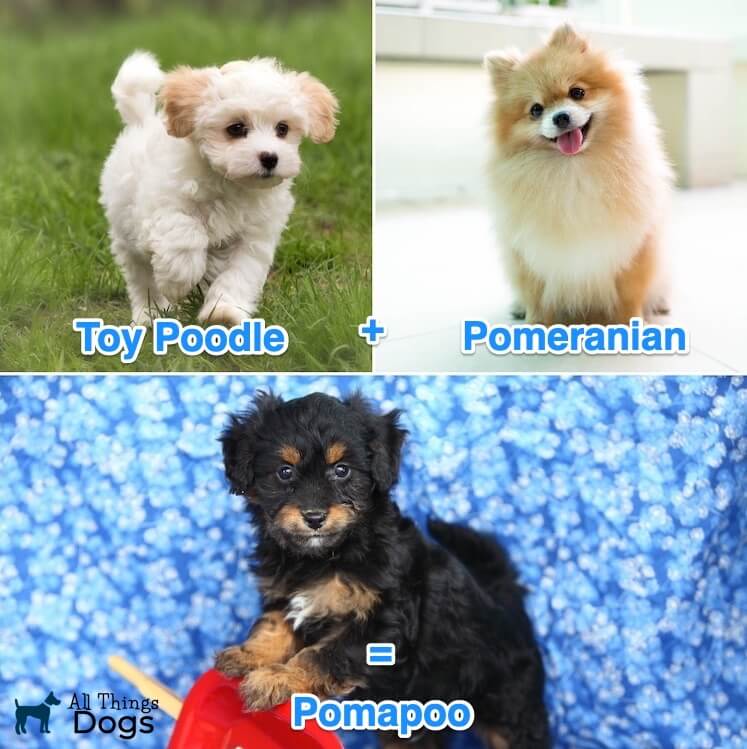
From Adobe Stock
TABLE OF CONTENTS
- Pomapoo Quick Summary
- Origins of the Pomeranian Poodle Mix
- Physical Appearance of Pomapoos
- Pomeranian Poodle Mix Personality and Temperament
- Taking Care of a Pomapoo
- Training and Exercise Needs of Pomapoos
- Common Health Concerns in A Pooranian
- Adoption and Buying Tips
- Frequently Asked Questions About Pomeranian Poodle Mixes
- So, Should You Get a Pomeranian Poodle Mix?
- Other Pomeranian and Miniature or Toy Poodle Mixes
Pomapoo Quick Summary
Origins of the Pomeranian Poodle Mix
The Pomapoo is a crossbreed that emerged in recent decades, part of a growing trend in designer dog breeds. Their creation was driven by a desire to blend the intelligence and hypoallergenic coat of the Poodle with the spirited personality of the Pomeranian.
Pomeranian Heritage
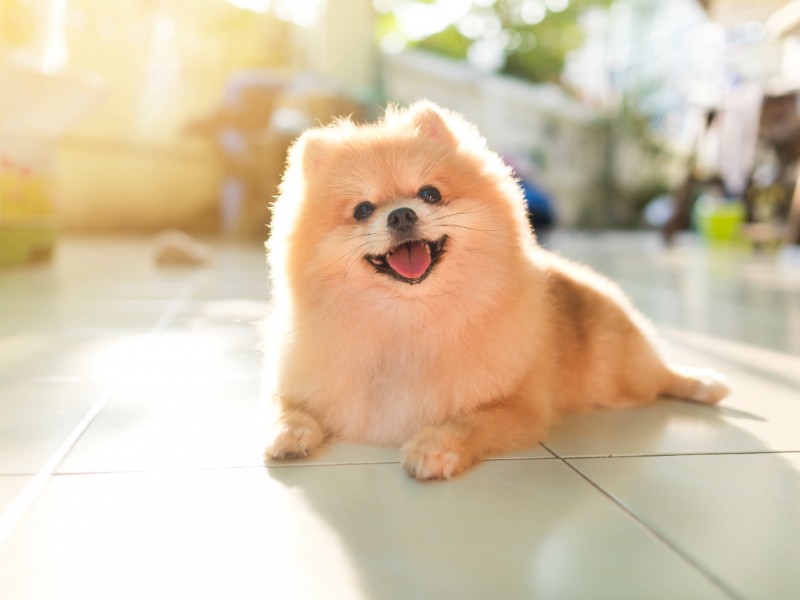
From Adobe Stock
Originating from the Pomeranian region in Northern Poland and Germany, Pomeranians are known for their small size and luxurious fur. Historically, they were larger sled dogs, which evolved into the toy-sized companions we know today. Their bold and vivacious nature has made them a favorite among royals and commoners alike.
Poodle Influence
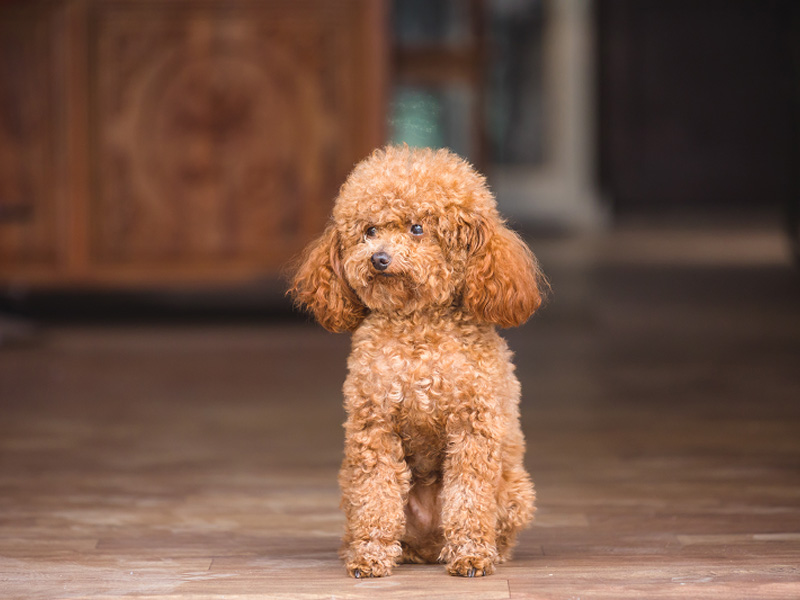
From Adobe Stock
The Poodle, known for its intelligence and non-shedding coat, has its roots in Germany and France. Originally bred as a water retriever, the Poodle’s keen intelligence and trainable nature have made it a popular breed worldwide. The standard, miniature, and toy varieties offer a range of sizes, each contributing unique traits to the Pomapoo.
The Rise of the Pomapoo
The Pomapoo gained popularity as a companion dog, particularly among those seeking a small, intelligent, and low-shedding pet. This hybrid aims to capture the Pomeranian’s spirited charm and the Poodle’s elegance and brainpower, making it a sought-after breed in modern times.
The Pomeranian poodle mix was first intentionally bred in the 1990s in North America. Pomapoos were bred to be healthier than their parent breeds.
Physical Appearance of Pomapoos

From Adobe Stock
The Pomapoo stands out with its distinctive physical traits, reflecting the harmonious blend of its parent breeds. This small yet elegant dog captivates with a variety of coat colors and endearing facial features.
Size and Build
The Pomapoo typically exhibits a small stature, inheriting its size from its Pomeranian and Poodle ancestors. Generally, they weigh between 5 to 15 pounds and stand about 8 to 10 inches tall at the shoulder. Their build reflects a harmonious blend of both breeds, showcasing a sturdy yet elegant frame.
Coat and Color
One of the most distinctive features of the Pomapoo is its coat. This breed can inherit the Pomeranian’s fluffy fur or the Poodle’s curly coat, and sometimes a delightful mix of both. The coat comes in various colors, including black, white, brown, red, and cream, often combined with beautiful patterns and markings.
Facial Features and Appearance
Pomapoos often have a teddy bear-like appearance, with expressive eyes and a cute, button-like nose. Their facial features can vary, but they typically have a rounded head, with ears that can either stand up like a Pomeranian’s or hang down like a Poodle’s. Their endearing expressions are one of the many reasons they are so beloved.
Pomeranian Poodle Mix Personality and Temperament
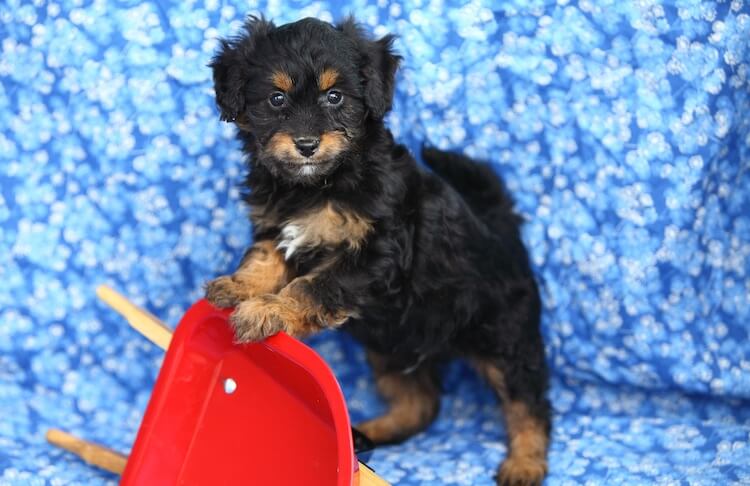
From Adobe Stock
The Pomapoo’s personality and temperament, enriched by the traits of their Pomeranian and Poodle ancestors, offer a delightful mix of intelligence, affection, and playfulness. This section explores the varied behavioral aspects that contribute to the Pomapoo’s charm as a companion pet.
Intelligence and Trainability
Pompapoos inherit their sharp intellect and trainability from their Poodle lineage. They are quick to learn and respond positively to reinforcement-based training methods. This intelligence makes them apt for obedience and agility training, showcasing their mental agility and willingness to learn.
Affectionate and Sociable Nature
Renowned for their affectionate nature, Pompapoos crave human interaction and establish strong familial bonds. They are naturally sociable, getting along well with other pets and people, though early socialization is crucial to foster their amiable traits.
Energy Levels and Playfulness
Drawing from the Pomeranian’s lively spirit, Pompapoos are playful and energetic. They enjoy engaging in play and require regular exercise, but are equally content with quiet cuddle times. Their energy levels strike a balance, suiting various lifestyle needs.
Vocal Tendencies
Pompapoos may inherit the Pomeranian’s tendency to bark, often used as a form of communication or alert. While not excessively noisy, they can be vocal in expressing their needs or alerting to unfamiliar situations. Consistent training and socialization from a young age can help manage and understand their barking habits.
Taking Care of a Pomapoo
Caring for a Pomapoo involves understanding and catering to their specific needs, derived from their unique blend of Pomeranian and Poodle traits. From grooming essentials to dietary considerations, this section provides valuable insights into maintaining the health and happiness of these charming dogs.
Grooming Essentials
Pomapoos require a consistent grooming routine to maintain their health and appearance. This routine is crucial not only for aesthetic reasons but also for their overall well-being. Regular grooming involves brushing their coat to prevent matting, which is essential regardless of whether they have the Pomeranian’s fluff or the Poodle’s curls. Bathing them at appropriate intervals keeps their skin healthy and coat shiny, while routine care like nail trimming and ear cleaning is essential for preventing infections and other health issues.
Diet and Nutrition
The dietary needs of a Pomapoo are an important aspect of their overall care, directly impacting their health and vitality. A well-balanced diet tailored to their specific needs can significantly enhance their quality of life. When planning their diet, consider the following essential nutrients:
- Protein: Crucial for muscle development and coat health.
- Fats: Including omega-3 and omega-6 fatty acids for energy and maintaining healthy skin.
- Carbohydrates: Provide essential energy but should be balanced to avoid weight gain.
- Fiber: Important for digestive health and maintaining bowel regularity.
- Calcium and Phosphorus: Key for maintaining strong bones and dental health.
- Vitamins A, C, and E: Critical for immune function and maintaining skin and coat health.
- B Vitamins: Play a vital role in energy metabolism and overall health.
- Iron and Zinc: Essential for blood health and a strong immune system.
Selecting a high-quality dog food formulated for small breeds can provide these nutrients in the right balance. Monitoring portion sizes to match their activity level is also key to maintaining a healthy weight.
Comfort and Living Environment
Creating a nurturing environment for a Pomapoo goes beyond meeting their basic needs; it involves creating a space where they feel safe, loved, and stimulated. Consider the following when setting up their living space:
- A Cozy Bed or Crate: Provides a sense of security and a personal space for relaxation.
- Designated Play Areas: Essential for mental stimulation and physical exercise.
- Temperature Control: Particularly important for small breeds like the Pomapoo to maintain comfort in varying weather conditions.
- Constant access to fresh water: Ensures hydration, a fundamental aspect of their health.
Training and Exercise Needs of Pomapoos
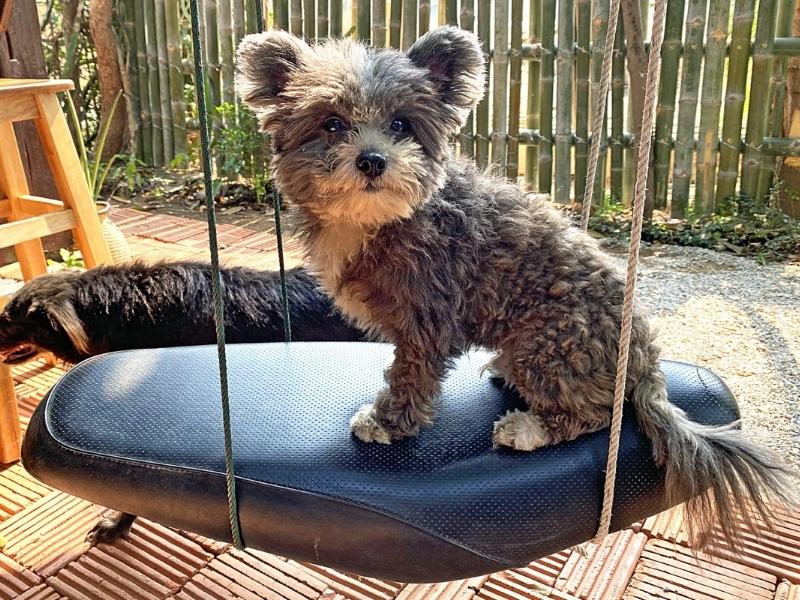
From Adobe Stock
Training and exercise are integral to the well-being and happiness of a Pomapoo. These activities not only keep them physically fit but also mentally stimulated and socially engaged. Understanding the specific training and exercise needs of Pomapoos will help in nurturing a well-behaved and content companion.
Training Essentials
Pomapoos inherit their intelligence and eagerness to please from both Pomeranian and Poodle lineages, making them generally responsive to training. Key training essentials include:
- Early Socialization: Exposing them to different people, pets, and environments early on is crucial for a well-rounded temperament.
- Obedience Training: Basic commands like ‘sit’, ‘stay’, ‘come’, and ‘leave it’ are fundamental. Pomapoos are capable of learning quickly, making training a rewarding experience.
- Positive Reinforcement: They respond well to positive reinforcement techniques. Rewards, praise, and treats can be effective tools in encouraging desired behavior.
- Consistency: Regular training sessions help reinforce learned behaviors and maintain discipline.
- Potty Training: Consistency and patience are key. Crate training can be an effective method for housebreaking.
Exercise Needs
Despite their small size, Pomapoos possess a moderate level of energy and require regular physical activity. Appropriate exercise includes:
- Daily Walks: Short to moderate walks are essential for physical health and mental stimulation.
- Playtime: Interactive play sessions, whether indoors or in a fenced yard, provide good physical exercise and strengthen the bond between pet and owner.
- Mental Stimulation: Puzzle toys, hide-and-seek games, and training exercises keep their minds active and prevent boredom.
- Agility Training: For more active Pomapoos, agility training can be an enjoyable way to expend energy and use their intelligence.
Common Health Concerns in A Pooranian

From Adobe Stock
Like many mixed breeds, the Pomeranian poodle mix is considered relatively healthy, but the dog is prone to certain health issues.
Cataracts in Pomapoos
Cataracts are a significant health concern in Pomapoos, characterized by a cloudy or opaque area in the eye’s lens. This condition can lead to blindness if left untreated. Fortunately, cataracts can be surgically removed. It’s crucial to monitor your Pomapoo’s eyes and consult a veterinarian if you notice any signs of cataracts.
Patellar Luxation
Patellar luxation is a condition where the kneecap moves out of its normal position. In Pomapoos, this can manifest as knee weakness, pain, and imbalance. Treatment options vary, ranging from physiotherapy to, in some cases, surgery. Early detection and treatment are key to managing this condition effectively.
Epilepsy in Pomapoos
Epilepsy is a neurological disorder that Pomapoos can inherit, characterized by recurrent seizures. These seizures are the primary symptom of the condition. Feeding them a nutritious diet can help manage their epilepsy, it’s essential to work closely with your veterinarian to develop a comprehensive care plan for your Pomapoo. Regular veterinary care is important to monitor and adjust treatment as needed.
Tracheal Collapse
Tracheal collapse is a condition where the rings of cartilage around the trachea weaken and flatten, restricting airflow to the lungs. Symptoms include a persistent dry cough. Treatment varies based on severity, ranging from medication and weight management to surgery in more severe cases. Maintaining a healthy weight and regular veterinary check-ups can help manage this condition.
Adoption and Buying Tips
When considering bringing a Pomapoo into your home, whether through adoption or purchase, it’s important to approach this decision with care and responsibility. This section offers tips to help you navigate the process, ensuring you make a well-informed choice that’s right for both you and the dog.
Researching Breeders and Adoption Centers
- Reputable Breeders: Look for breeders who are transparent about their breeding practices and health clearances of the parent breeds. A good breeder will be knowledgeable about the Pomapoo breed and willing to answer all your questions.
- Adoption Centers: Consider adopting from shelters or rescue organizations. While Pomapoos are a specific mix, you can sometimes find them, or similar mixes, in need of homes.
- Health Records: Whether adopting or buying, ensure you have access to the dog’s health records. This includes vaccination history and any genetic testing done on the parents.
Meeting Your Potential Pomapoo
- Interaction: Spend time interacting with the Pomapoo before making a decision. Observe their temperament, how they interact with people and other animals, and their overall health.
- Ask Questions: Don’t hesitate to ask questions about their history, temperament, health issues, and any behavioral concerns.
Preparing for Arrival
- Home Preparation: Ensure your home is prepared for a Pomapoo’s arrival with appropriate bedding, food, and water bowls, and a safe, enclosed space for them to relax.
- Budgeting for Costs: Consider the financial aspect of owning a Pomapoo, including food, grooming, veterinary care, and emergency medical expenses.
Post-Adoption Care
- Veterinary Visit: Schedule a veterinary visit soon after adoption to establish a health baseline and discuss a care routine.
- Patience and Training: Be prepared to invest time in training and socializing your new pet, especially if they are a puppy or if they have been through stressful situations in the past.
Frequently Asked Questions About Pomeranian Poodle Mixes
How much is a Pomeranian Poodle Mix?
A Pomeranian poodle mix costs $500 to $2,000. Pomapoo puppies from breeders are the most expensive, whereas pomapoos from adoption centers can cost less than $500.
How much does it cost to raise a Pomapoo?
Because of its small size and lower food needs, the Pomapoo can cost less to raise than bigger breeds. In the first year of owning a pomapoo puppy, expect to pay up to $2,000 for vaccinations, toys, and equipment. Healthcare and food for your pomapoo will cost around $100 per month, depending on the individual dog’s healthcare needs. The cost will increase if you require dog-sitting or dog-walking services.
How long do Pomapoos typically live?
Pomapoos generally have a lifespan of 12 to 15 years. With proper care, regular veterinary check-ups, and a healthy lifestyle, they can enjoy a long and happy life.
Are Pomapoos hypoallergenic?
While no dog is completely hypoallergenic, Pomapoos, inheriting the Poodle’s coat traits, are often more suitable for people with allergies. They tend to shed less and produce fewer allergens compared to many other breeds.
Do Pomapoos get along with other pets?
Yes, Pomapoos generally get along well with other pets, especially when socialized from a young age. Their friendly and sociable nature makes them good companions for other dogs and even cats.
Can Pomapoos participate in dog sports?
Yes, Pomapoos can participate in dog sports like agility and obedience trials, thanks to their intelligence and agility.
So, Should You Get a Pomeranian Poodle Mix?
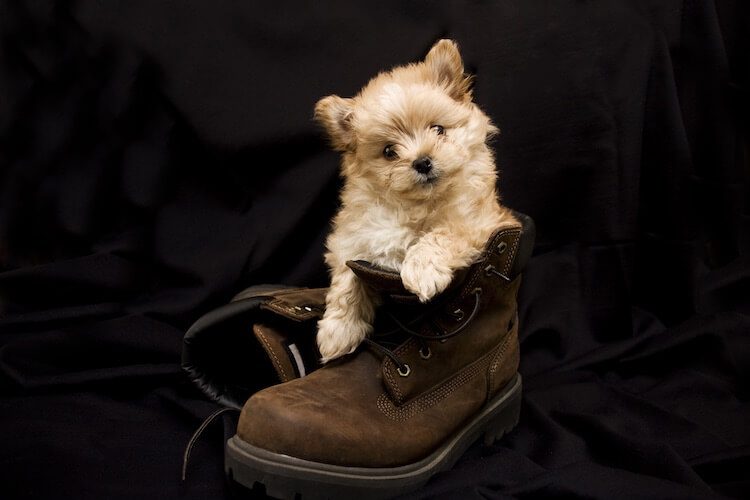
From Adobe Stock
In considering whether a Pomapoo is the right pet for you, it’s essential to weigh their characteristics against your lifestyle and preferences. This final section provides a balanced view, helping you determine if a Pomeranian Poodle mix aligns with your expectations and living situation.
Pomapoos are Suitable For
- Families and Individuals Seeking a Companion Pet: With their affectionate and sociable nature, Pomapoos make excellent companions for both families and individuals. They are particularly well-suited for those seeking a loyal and loving pet.
- Those Looking for a Smaller Dog: Their small size makes them ideal for apartment living or homes with limited space.
- Owners Ready for Regular Grooming: If you enjoy or don’t mind the grooming process, a Pomapoo’s coat offers a delightful opportunity for bonding and care.
- Active Seniors or Those with a Moderately Active Lifestyle: Their exercise requirements align well with those leading a moderately active lifestyle. They are great for seniors who enjoy regular walks and playtime.
- First-Time Dog Owners: Their trainability and manageable size make them a good choice for first-time dog owners willing to invest time in training and care.
Pomapoos are Not Suitable For
- Those Absent for Long Hours: Pomapoos thrive on companionship and may not do well if left alone for extended periods.
- Families with Very Young Children: Although they are generally good with children, their small size can make them vulnerable to unintentional rough handling by very young kids.
- Owners Reluctant to Commit to Regular Grooming: Their coat requires consistent care, which might be challenging for those not willing to commit to regular grooming.
- Those Seeking a Guard Dog: Due to their small size and friendly nature, Pomapoos are not suitable for those looking for a dog with guarding instincts.
- Highly Active Individuals Seeking an Exercise Companion: While they enjoy exercise, Pomapoos might not keep up with highly active or athletic owners.
Deciding to bring a Pomapoo into your life is a decision that should be made with consideration of these factors. They are a delightful breed, offering love and companionship, but they also require care and attention to thrive. If their traits align with your lifestyle, a Pomapoo can be a wonderful addition to your family.
Other Pomeranian and Miniature or Toy Poodle Mixes
If you’re interested in learning about other Pomeranian mixes or Miniature or Toy Poodle mixes, check out the hybrid dog breeds below.


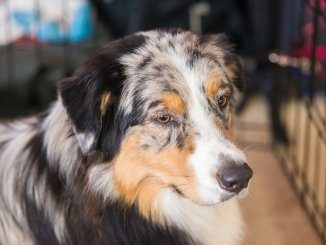

I have just bought a pomapoo, she is gorgeous and we love her so much, she is very clever, cute, eager to please, but toilet training is a nightmare. Has anyone any advice please
We just got one as well and you just have to be consistent. Leave the potty pad in the exact same place. When I see him start to smell the floor I take him quickly to the pad for his business.. when he gets out of his crate he now goes straight to potty pad to pee.. we’re still working with him though.. he misses at times but we’ve only had him 4 days. He is very smart and lovable it will just take lots of patience. Good luck!! 🐶
I have two and also find it a nightmare
Got a pomapoo last week. She’s such a cutie and very smart. Sometimes she does her business right away and other times she’s more interested in chewing on the grass.
I got a Pomapoo and he is very hyper, playful and loves to cuddle. Still working on potty training, he is not quite there yet.
I love my pompapoo! He is 6 months old now. He is black and white and we named him Oreo. He is lots of fun and has brought new life to our home.